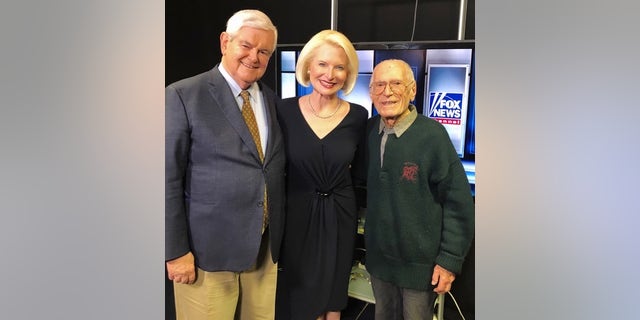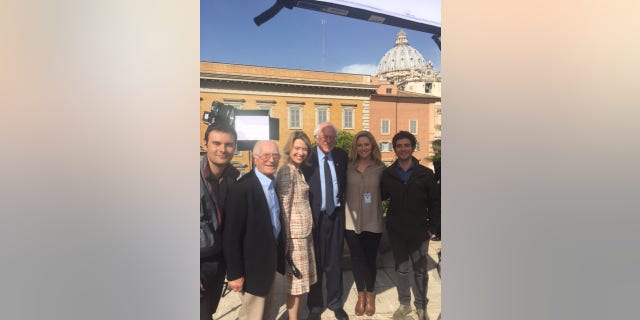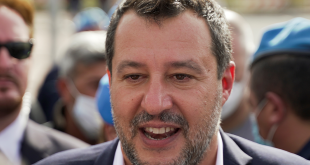
Believe it or not, Mario Biasetti surprised us with his announcement, but he is not going to sit on a Mediterranean beach. Ninety-six-year-old Mario Biasetti, a man who’s been called one of the deans of international journalism and whom we have effectively called the Fox News Rome bureau chief for the past two decades, is hanging up his news hat.
Former longtime Fox News Rome correspondent Greg Burke credits Mario with having shown him the ropes.
“What a career!” Burke said of Mario. “I came to Fox without a TV background and couldn’t have found anyone better to teach me the business. He was doing TV before I was born. Literally.”
But Mario’s not retiring so that he can garden, play golf or just chill out. He’s got another project lined up. He’s going to write that book he’s been talking about for ages. “Relaxing,” he told me when we spoke on the phone this week, “is not in my nature. I don’t have hobbies.”
What Mario does have is a life story more than worthy of a book. I will give you some highlights of the story. A tease, as they call it, in our business.
BENJAMIN HALL REFLECTS ONE YEAR AFTER DEADLY UKRAINE ATTACK ON FOX NEWS JOURNALISTS: ‘REAL MIXED EMOTIONS’

Mario Biasetti, right, at the Fox News bureau in Rome with former Speaker of the House Newt Gingrich and his wife Callista. (Mario Biasetti )
Born in the Abruzzo region of Italy in 1926, Mario moved to Boston as a young boy not long before World War II broke out. He enlisted in the U.S. Army as soon as he was old enough and became a scout. His job was to move at the front of a diamond-shaped formation, alerting his comrades at the first sight of enemy troops as they progressed through France.
“I did the sign of the cross 50 times a minute,” Mario said about each time the Nazis opened fire. “And my Jewish buddy (his fellow scout at the top of the diamond) would mutter his prayers under his breath.”
Mario went on to receive a Bronze Star and Infantry Combat Badge for his service. His next military job was photographing license plates on Russian cars in Berlin right after the war to help Western intelligence keep tabs. This was an excellent segue to the next chapter of Mario’s life: TV news cameraman!
SEE MORE PICTURES FROM MARIO’S CAREER IN THIS PHOTO GALLERY
Upon his return to Boston, Mario found work with WBZ and other stations, but in reality he did more than that, often working as a one-man news band. In the days before drones and cell phones, there was a lot more improvising that went on to get the story, and Mario became expert at getting the goods, renting anything from cherry-pickers to airplanes—on the fly–so he could literally cover the story. He went on to work decades at CBS, where he documented wars and revolutions. Film, used back in the day, was handed off in reels to the first American heading back to the States with instructions to leave it at customs. They’d know what to do.
“Security wasn’t what it is today,” Mario said lightly.
REPORTER’S NOTEBOOK: FOX NEWS HEROES HONORED AT ITALIAN AWARDS CEREMONY

Mario Biasetti, Amy Kellogg and the Rome bureau crew stand with Sen. Bernie Sanders, D-VT. (Photo: Mario Biasetti)
Telegrams were king. Often they were the only means of communicating with bosses and family. In fact, each time Mario was meant to get married to his wife Joan, he said, he’d get sent on some assignment—often for months. Until he finally got a telegram from her saying “Now or never.” Mario recounts how he swiftly tacked a plea to his news editor to the end of one of the reels of footage he sent to New York. He was asking to be sent home right away. Mario’s request was swiftly honored.
Along the way, Mario learned the art of making friends wherever he could. Having worked with Mario, I can add that part of this was just his nature and not necessarily transactional. Nobody loves a good schmooze more than Mario. In our business, knowing lots of people is helpful if not crucial. For example, it was Mario’s friend in the coast guard who alerted him to the fact that the cruise ship the Andrea Doria was going down off Nantucket in 1956 and Mario got the images.
SEE MORE PICTURES FROM MARIO’S CAREER IN THIS PHOTO GALLERY
Mario was also fearless—spending the bulk of his working life in danger zones. From Cuba to Nicaragua to Iran to what was then Belgian Congo, now the Democratic Republic of Congo he had many a close call. Mario tells me he’s got more lives than a cat. He won the prestigious Robert Capa photographic prize in 1959 for his work in Nicaragua.
REPORTER’S NOTEBOOK: ITALY’S MELONI FACING FIRST CRISIS AS PRIME MINISTER OVER MIGRANT BOAT TRAGEDY
One story he loves to recount is getting to Fidel Castro in the Sierra Maestra Mountains of Cuba against all odds. The area had been declared off-limits by Castro himself, but he just kept telling Castro’s armed henchmen that he had an interview with “The Chief”. When Mario arrived, “The Chief” sent him packing. But Mario got there. And managed to secure a future interview by his efforts. He was in and out of trouble and up close and personal with the most powerful, alluring, and dangerous characters of the last century.
SEE MORE PICTURES FROM MARIO’S CAREER IN THIS PHOTO GALLERY
“I used my Italian charm. Italians do that well. You don’t get angry at someone smiling!” Mario says. While he relied on his Italian charm to get him out of pickles, he says feels very much American. “It is a great, great country. It gives you a chance, gives you an opportunity!”
Burke said Mario made the most of it.
“Mario is a great American success story. A lot of people forget that he was an Italian immigrant and came to the U.S. as a young kid. To think that he rose to become one of the best cameramen at CBS is pretty amazing. I have never seen anyone who loves TV news as much as Mario. That’s probably why he’s so good at it.”
CLICK HERE TO GET THE FOX NEWS APP

 Latest Breaking News Online News Portal
Latest Breaking News Online News Portal




